On November 8, 2016, Donald J. Trump was elected 45th president of the United States. In a well-established Brookings tradition, Brookings experts gathered after election day to discuss the results and offer their preliminary analyses about what happened and the road ahead for the new president.
David Wessel, senior fellow in Economic Studies and director of the Hutchins Center on Fiscal and Monetary policy, moderated the conversation with Stuart Butler, senior fellow in Economic Studies; John Hudak, senior fellow in Governance Studies and deputy director of the Center for Effective Public Management; Elaine Kamarck, senior fellow in Governance Studies and founding director of the Center for Effective Public Management; and Bruce Riedel, senior fellow in Foreign Policy and director of the Intelligence Project.
Below are some selected videos and quotes from the event. The full event video is here. You can also get research and analysis of issues in the election and the presidential transition.
Sustain and defend fundamental values
Wessel opened the event by noting that “No matter for whom we voted I think we all have a sense that something very big just happened in our country and occasions like this demand that we reexamine our prior beliefs and prejudices so that we can better understand the society in which we live, but they also demand that we sustain and defend the fundamental values and principles that we cherish as individuals, as an Institution here at Brookings, and indeed as a nation.” Watch:
Wessel emphasized three points to guide the discussion: “we believe in and practice respectful civil conversation and argument,” that “we should be very careful and humble today about predicting with certainty what follows Donald Trump’s victory,” and “in a think tank inside the Beltway … we need to avoid overgeneralizing and condescending to those Americans who voted for Donald Trump.”
Left out of economic progress?
Stuart Butler, an expert on health care reform and social policy, addressed the issue of Trump’s support from white working-class Americans who feel that they have been left out of economic progress. “There’s no question that among Trump supporters,” he said, there is “a feeling that the deck is somehow stacked against them, that they are not going to be better off.” Watch:
“It doesn’t have to be correct but there’s absolutely a perception of that,” Butler added. He suggested remedies, including putting efficiency and effectiveness back into government, addressing failures in school systems, and addressing infrastructure problems.
Later in the conversation, Butler also discussed the fate of the Affordable Care Act, aka “Obamacare,” and agreed with Wessel that “there will be a bill with the word ‘repeal’ in it,” but that it would be unlikely for any repeal legislation to “remove the availability of health care from millions of people.” Instead, Butler suggested, “you could see a dramatic change in the nature of the law without a change in the law,” including more responsibility for health care to the states and eliminating the mandate and exchanges. John Hudak observed that “there are a lot of members of Congress who came to Washington on the promise to repeal this law.”
The Republican Party came home for Donald Trump
Elaine Kamarck, an expert on American electoral politics, government innovation, and reform, offered her thoughts on what happened in the election. “I think the Republican Party simply came home,” she explained. When you look past his unorthodox personality, Kamarck said, his policy points “were very mainstream Republican Party policy points that have had a lot of appeal to people over the years.” Watch:
However, Kamarck also pointed out that at the “crux of the anxiety” about Donald Trump is people don’t know how much of his actions on the campaign trail were an act and how much was real. “The question really goes to,” she said, “the character of the man. Who is he? And is he the caricature that he stepped in to during the campaign or is there a serious person somehow behind that?”
How Trump might govern AND DELEGATE
Hudak, an expert on elections and questions of presidential power, looked ahead to how President Trump might govern and manage his priorities. “I think it’s likely that he is going to find a few priorities, a few pet projects, and run with [them],” Hudak observed. President Trump may not govern by delegating to Congress, which Trump has described as part of the corrupt system, but may delegate to the Cabinet and other agencies. Watch:
“I wouldn’t be surprised,” Hudak says, “if there are a lot of ‘you’re fireds’ along the way trying to achieve what he wants to achieve even if it’s not something he’s chasing after as a specific policy, if he doesn’t think it’s a win, then it’s a loss, and that person’s gone.”
Difficult to judge Trump’s foreign policy
Turning to President Trump’s foreign policy, a 30-year veteran of the CIA and an expert on terrorism and national security issues, noted that candidate Trump “has in the course of the campaign challenged some of the very cornerstones of American foreign policy as we have known them for the last 70 years.” Watch:
“I think we are going to see a foreign policy that is remarkably different than what we’ve seen before and remarkably different from what Republicans have spoken about before,” Riedel said, and added that “If you live in Estonia today, you should be scared of what your future looks like.”
The panelists also talked about why turnout was so low for Hillary Clinton, the challenge of the Republican Party building bridges to the non-white population, climate change initiative (“doomed in terms of any big national policy”) and marijuana legalization measures that passed across the country. Hudak, author of the recent Brookings book “Marijuana: A Short History” and who has been following the federalism challenges posed by marijuana legalization for recreational and medicinal purposes, called the passage of 5 recreational and 4 medical marijuana initiatives a “remarkable moment for the marijuana reform advocacy community” but that would “be an issue that President Trump [and] his attorney general are going to be facing in a significant way.”
A Constitutional test
“This first term will be the most significant test of our Constitution in a long time,” Kamarck argued. “We have to trust the Constitution. We have to trust that if Donald Trump gets baited and if he decides that he wants to do something that is out of proportion to the baiting, we have to trust that between the Congress and the Courts they can stop him.” Watch:
Get the full event video here. You can also get research and analysis of issues in the election and the presidential transition.
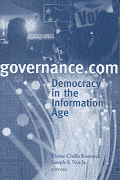

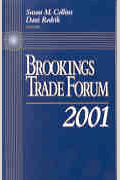
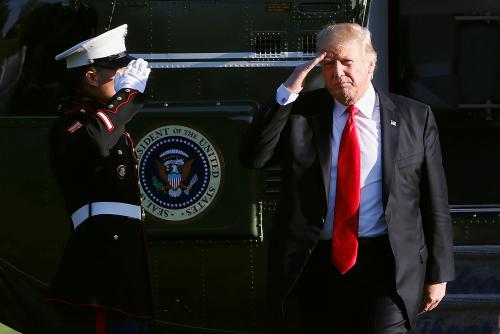
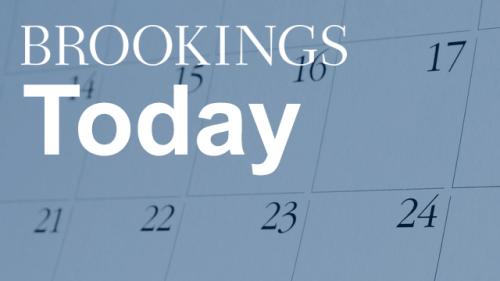
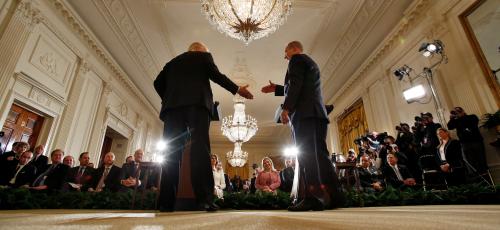




Commentary
Brookings experts address the 2016 election and the road ahead for President-elect Trump
November 10, 2016